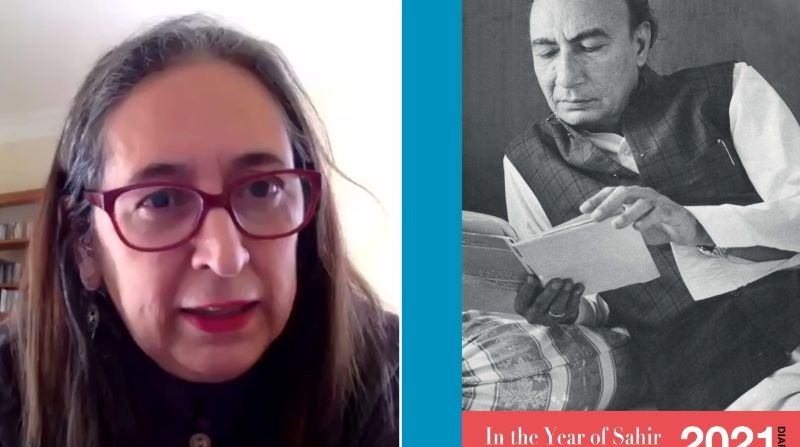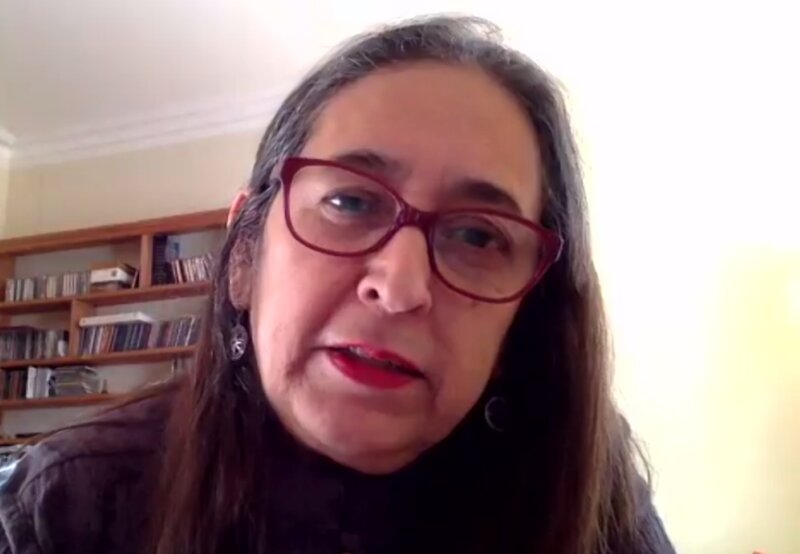 Nasreen Munni Kabir
Nasreen Munni Kabir
Sahir Ludhianvi's songs have tinge of melancholy in the idea of romance: Author Nasreen Munni Kabir
Author Nasreen Munni Kabir was the guest at the "tête-à-tea" organised by Prabha Khaitan Foundation. During her conversation with Namrata Joshi, Kabir spoke about her latest book In the Year of Sahir 2021 Diary which is based on poet-lyricist Sahir Ludhianvi. India Blooms correspondent Souvik Ghosh brings excerpts
How did you discover Sahir? Can you go back to those memories?
Honestly to me, it was Pyaasa. The cinema was shown in London. It was the songs. The Urdu was difficult. So I didn't understand the whole meaning of his words. But I think he is amazingly romantic in one way, but underneath that there is a layer of melancholy and that struck me more. He manages to describe emotions in very simple and effective terms. But there is a sad ending. They are not happy songs. I think the romantic songs that we remember are the sad ones. When we are sad, we listen to sad songs and not the disco songs. He really connects to people who are discerning and caring about the world but have a tinge of melancholy in the idea of romance.

And he talks about the deeper issues and philosophies of life and all. When I opened the diary, the first page I landed upon was Gulzar saab talking about Man Re Na Kahe Na Dhir Dhare (song). I think that one song encapsulates life as it is for many of us. Again in the past nine months (Covid-19 era), that has spoken to us so deeply.
Yes, absolutely. That's the right song for lockdown. But the fact of the matter is that many people have remarked that actually he had such mastery over language, be it in Hindi or Urdu, that he knew how to convey the very deep philosophical ideas in simple terms.

What was special about Sahir when it came to film lyrics?
Most of the Urdu poets of that era had to work in films in order to earn money because publishing was not paying money so much. He worked with Arnold brothers and Chetan Anand. So from the very start, he was not working for C-grade films but with the top people of the era like Dev Anand and SD Burman, who were very educated and sophisticated people. He was moving in an educated milieu. He was not asked to lower the tone of his lyrics ever.
So his literary and poetic elements were never compromised yet it wasn't so obscure that couldn't reach out to the common people. Both were nicely balanced.
I will say the most difficult thing was to appeal to everybody. One can only do that if he masters something and speaks in a very straightforward language. When one knows something, he or she will say it simply but will beat around the bush if someone doesn't know. He knew how to use language and in what context. He also knew the character. He also used to write the poetry, lyrics and the song which will match with the character of a particular film.

Don't you think he had reached out to people because of a team work with the director and composer?
Absolutely. A film is made by a team and not just a director. It is more so in the Hindi cinema because there are various fragmentations in the creation of the film. But the director chooses the right person for each fragment.
Support Our Journalism
We cannot do without you.. your contribution supports unbiased journalism
IBNS is not driven by any ism- not wokeism, not racism, not skewed secularism, not hyper right-wing or left liberal ideals, nor by any hardline religious beliefs or hyper nationalism. We want to serve you good old objective news, as they are. We do not judge or preach. We let people decide for themselves. We only try to present factual and well-sourced news.







